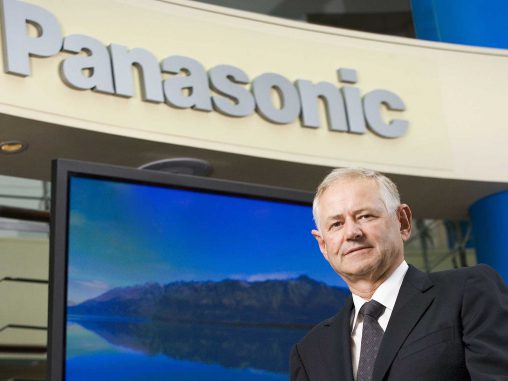
Steve Rust is retiring from the managing director position at Panasonic Australia after seven years at the helm and eight in total at the company. Paul Reid, who is currently heading up Panasonic’s Nordic division, will take over in April.
The question is, ‘Are you leaving Panasonic Australia in a better place than you found it?’ and the answer is laughter, “Yes, absolutely” and then more laughter. Rather than elaborate on any personal success (or the state the company was in when he arrived) retiring Panasonic Australia MD Steve Rust immediately deflects the questions, preferring to credit the forward progress to the team:
“I’ve got a very mature team here, very motivated in what they do, very skilled and they are very professional and it’s a solid group of people,” he said. “Our relationships with the market through the various channels, whether it’s the retailers or B2B, are in a very sound footing. I feel very good about leaving a company that is in a stable position.”
It is unsurprising that Rust would prefer to focus on group success of Panasonic Australia during his reign than bask in any personal success. Equally comfortable in high-level meetings with Japanese executives as he is taking the microphone for a midnight karaoke session, Rust always exudes a calming and confident influence. Staff at the company talk of his dry sense of humour and the community he has fostered at the company’s North Ryde (nee Belrose) head office.
Click here to sign up for our free daily newsletter
Across 30 years in the Australian consumer electronics industry, Rust has been the managing director of Ingram Micro, the vice president of Nortel Networks, the general manager of Apple Australia and the sales director of Toshiba Australia. During his time at Panasonic Australia, Rust worked closely with several of his former employers to develop the Australia and New Zealand Recycling Platform (ANZRP), a not-for-profit recycler of end-of-life TVs and computer products.
“I think my proudest achievement is the development of my team, essentially the management team has been here more than five years — some of them the whole time I have been here — and that builds a very mature team, very well regarded in the industry,” he said.
That team includes Richard Tassone, Alistair Robins, Sophie Barton, Gemma Lemiuex and Shona Hannon.
“When I think about leaving Panasonic and moving on to my next chapter, I leave with a certain amount of sadness and it’s really around the relationships I have forged with my staff and with key customers as well. The staff here is first class, a very professional group of people.”
Rust has said that he will not be pursuing a fulltime management role but is interesting in expanding his work at board level, especially with the ANZRP.
“I’ve enjoyed that and I want to expand my board experience and work in some board advisory areas.”
Other highlights of Rust’s Panasonic tenure were the successes of Viera Plasma TVs and Lumix digital cameras:
“The campaigns and promotions around pushing Plasma into the market here in Australia and achieving the highest market share anywhere in the world outside Japan was a big highlight” he said. “Another one has been, a few years ago, before the camera market got into some challenges, the launch and penetration of the market with the Lumix brand.
“When I arrived here, we had about 2 per cent share and at one stage in the compact market, Lumix was touching up there with the market leaders and so that was a very exciting time.”
Over the past decade, while Panasonic’s rivals have been decimated by the tabloid press, Rust’s ability to placate the media has played a huge role in its continued stability during a period of great volatility, one that has seen Panasonic’s core competency, Plasma TVs, impugned by aggressive discounting.
“One of the key things I’ve learnt is just how rapidly the market can change in a category,” Rust said. “It’s incredible how a market come and go – they can grow quickly and they can disappear quickly – and we saw that in the last six years with the tremendous growth in the television market and then the normalisation of that market in the last 2-to-3 years, and likewise in the camera market there has been such rapid change.”
Rust was never backward in confronting change. While other managing directors in the industry describe themselves as ‘old school’ — a euphemism for ‘unable to adapt’ — Rust set about adopting new digital strategies and embracing changes to the traditional sales and marketing landscape.
“The consumer electronics industry has been a volatile industry over the last 4-to-5 years and we have continually transformed and realigned the company to respond to the dynamics of that market.
“We really pioneered some of the early work in shifting our marketing from traditional marketing into the digital area and we really got going early with Facebook and Twitter and YouTube.”
Although Rust said he was very pleased that there has been such strong growth in Panasonic Australia internet and social media presence and that it is now “an essential part of what we do”.
In a tick of approval for Steve Rust’s period of leadership and a vote of confidence in his management team, Panasonic has chosen Paul Reid to be the new managing director. Reid formally headed up the sales division before moving to Stockholm, Sweden, to lead Panasonic’s Nordic division. Rust said this decision was a reward for stable management by a stable team.
“That underpins why my successor is an Aussie,” he said. “I’m glad it is an Aussie, I think it’s appropriate that an Aussie heads up an Aussie company, no matter who owns that company.
“Paul Reid is well-respected within Panasonic and the consumer electronics industry. He will provide strong leadership and continuity for the local company. I wish him every success.”

